Tree Service Geneva
Find the best Tree Care in Geneva
Get 3 FREE Local Tree Service quotes for your project today! Compare profiles, reviews, accreditations, portfolio, etc... and choose the best service.
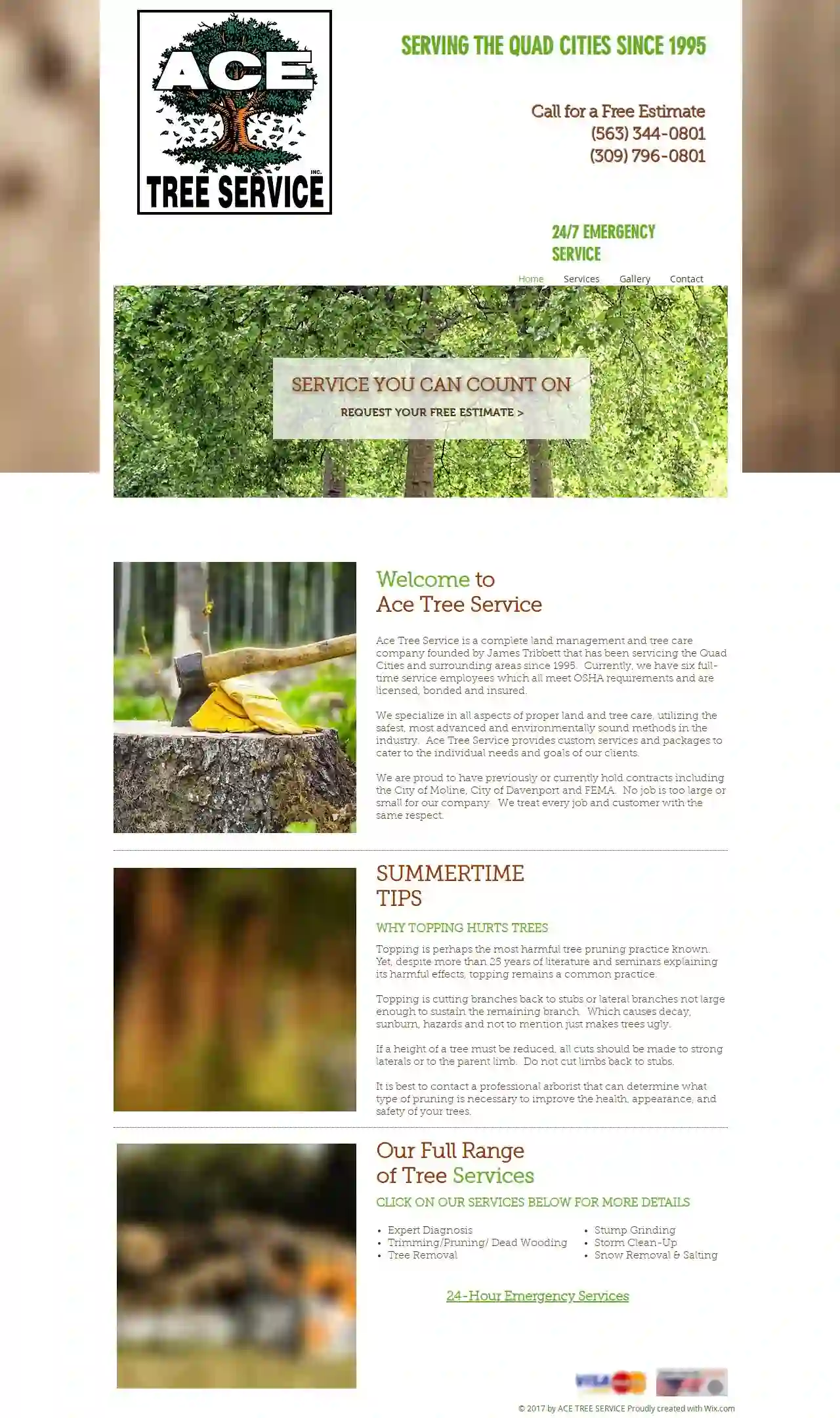
Ace Tree Services
4.58 reviews123 Main St, Moline, 61201, USAce Tree Service is a complete land management and tree care company founded by James Tribbett that has been servicing the Quad Cities and surrounding areas since 1995. We specialize in all aspects of proper land and tree care, utilizing the safest, most advanced and environmentally sound methods in the industry. Our services include expert diagnosis, trimming/pruning/dead wooding, tree removal, stump grinding, storm clean-up, snow removal & salting, and 24-hour emergency services.
- Services
- Why Us?
- Accreditations
- Our Team
- Testimonials
- Gallery
Get Quote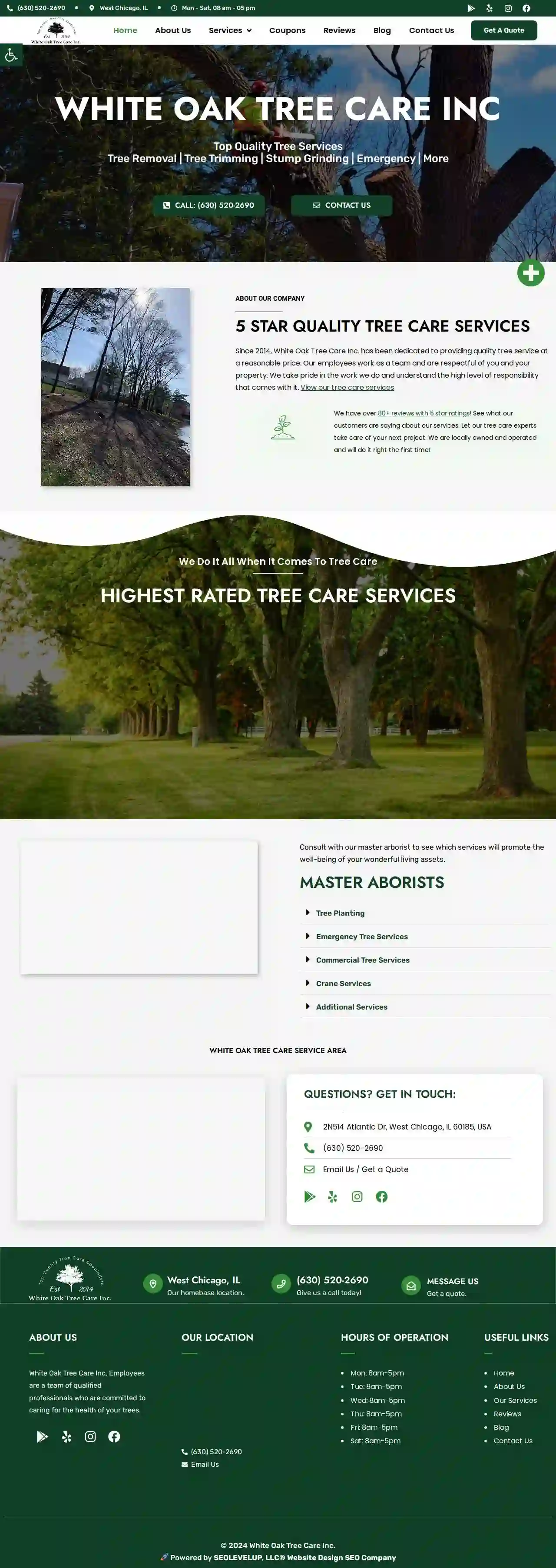
White Oak Tree Care Inc.
5207 reviewsWest Chicago, IL, USA, 2N514 Atlantic Dr, 60185, USWhite Oak Tree Care Inc. has been dedicated to providing quality tree service at a reasonable price since 2014. Our employees work as a team and are respectful of you and your property. We take pride in the work we do and understand the high level of responsibility that comes with it. Our services include tree removal, tree trimming, stump grinding, tree healthcare, tree planting, emergency services, commercial services, crane service, plant healthcare, and additional services.
- Services
- Why Us?
- Accreditations
- Our Team
- Testimonials
- Gallery
Get Quote
Tree Cutters Experts Inc
51 reviewsTree Cutters Experts Inc., Office, Chicago, IL, 60636, USTree Cutters Experts Inc. is a licensed company with over 25 years of experience providing first-class tree services. Our team of licensed experts covers a 40-mile radius around Chicago, IL, ensuring that your trees receive the proper care they need. Our comprehensive tree services are designed to cover all of your tree-related needs, from trimming and pruning to cutting, removal, and stump grinding. Our friendly and professional team is always ready to listen to your needs and ensure that we exceed your expectations.
- Services
- Why Us?
- Accreditations
- Our Team
- Testimonials
- Gallery
Get Quote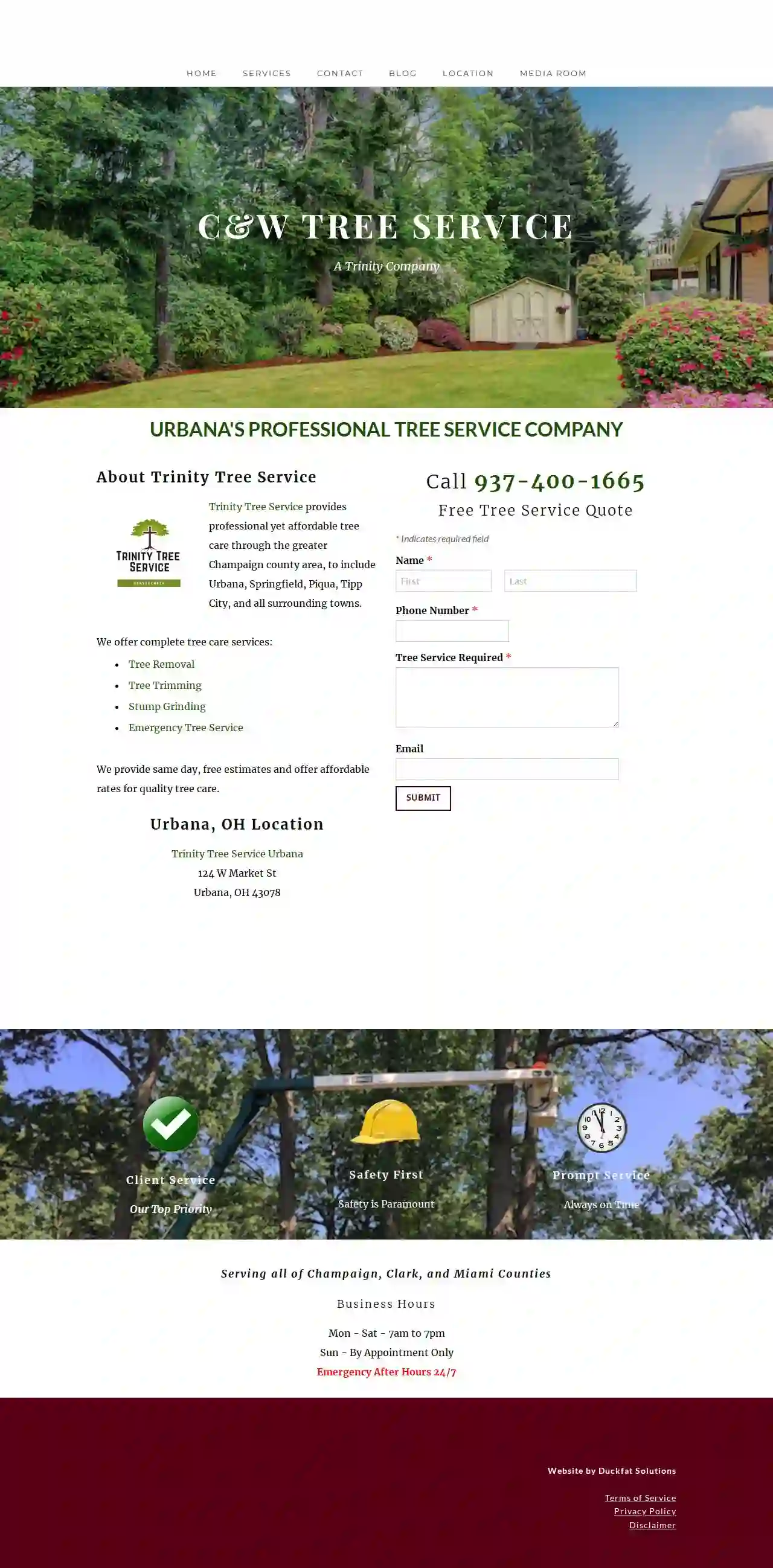
Trinity Tree Service Urbana
4.98 reviewsUrbana, OH, 124 W Market St, 43078, USTrinity Tree Service provides professional yet affordable tree care through the greater Champaign county area, to include Urbana, Springfield, Piqua, Tipp City, and all surrounding towns. We offer complete tree care services: Tree Removal, Tree Trimming, Stump Grinding, Emergency Tree Service. Our company was founded to provide expert tree care at affordable prices and to offer the best customer service in the business.
- Services
- Why Us?
- Accreditations
- Our Team
- Testimonials
- Gallery
Get Quote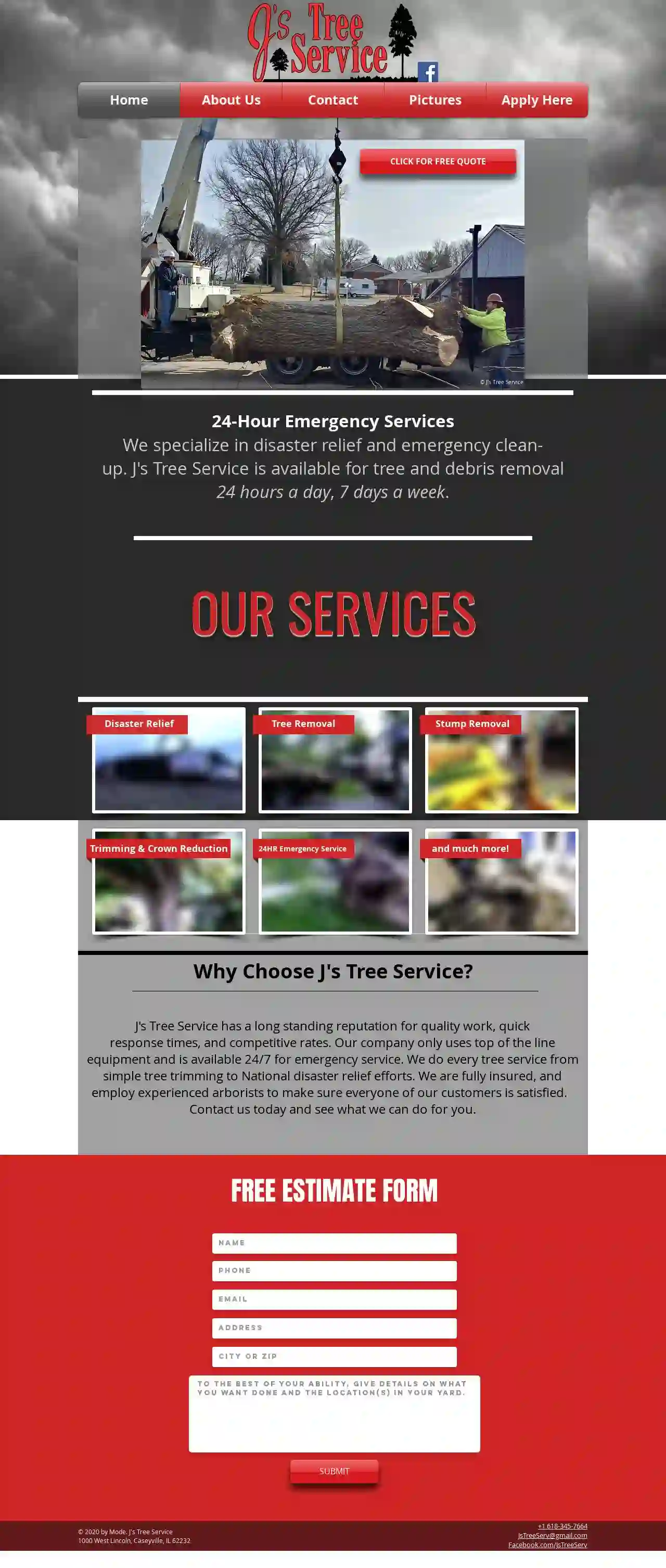
Js Tree Service
4.344 reviews1000 West Lincoln, Caseyville, IL, 62232, USJ's Tree Service has a long standing reputation for quality work, quick response times, and competitive rates. Our company only uses top of the line equipment and is available 24/7 for emergency service. We do every tree service from simple tree trimming to National disaster relief efforts. We are fully insured, and employ experienced arborists to make sure everyone of our customers is satisfied.
- Services
- Why Us?
- Gallery
Get Quote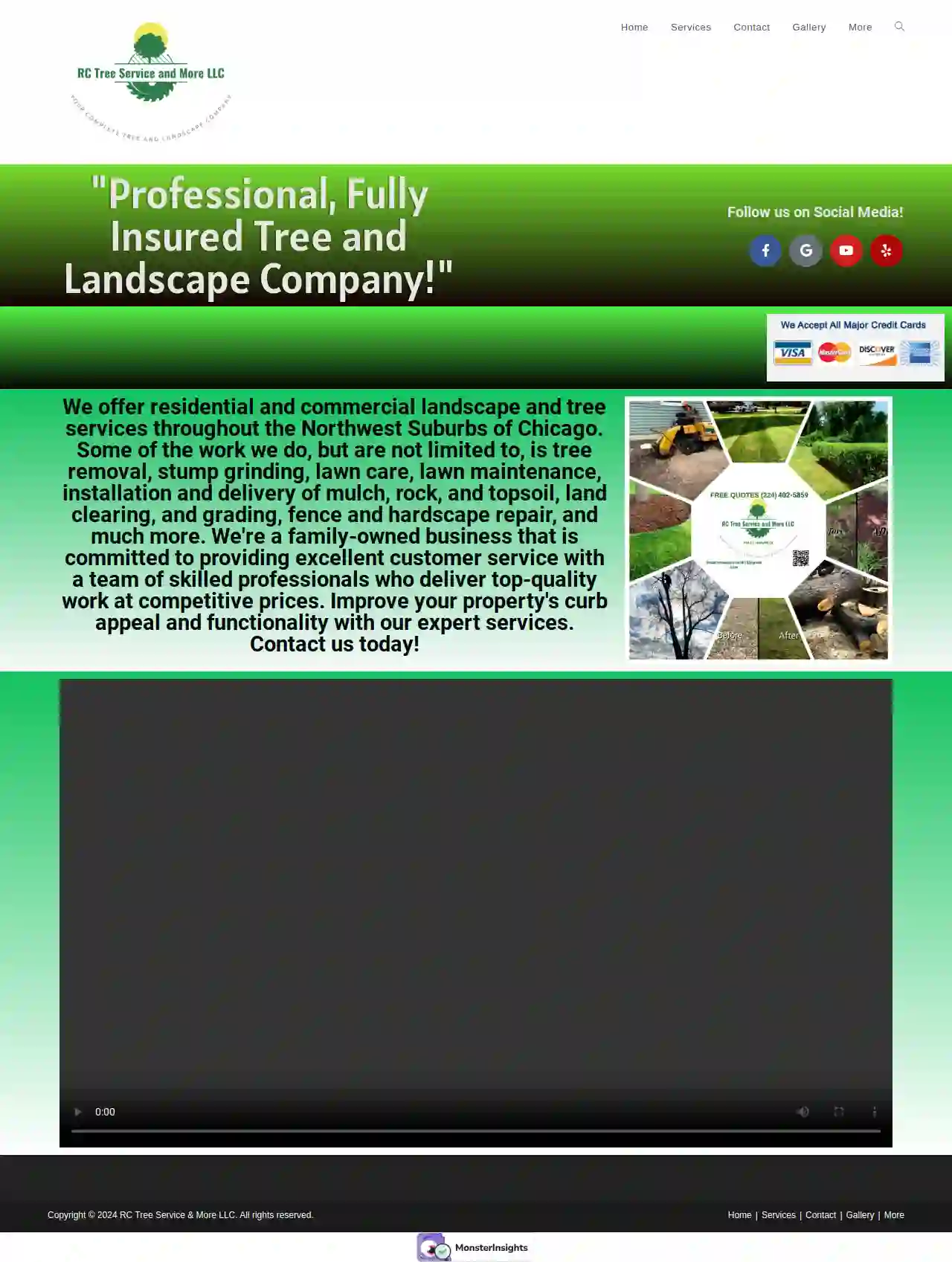
RC Tree Service & More LLC
514 reviewsChicago, USRC Tree Service & More LLC is a family-owned business that offers residential and commercial landscape and tree services throughout the Northwest Suburbs of Chicago. They provide a range of services including tree removal, stump grinding, lawn care, lawn maintenance, installation and delivery of mulch, rock, and topsoil, land clearing, and grading, fence and hardscape repair, and more. The company is committed to providing excellent customer service with a team of skilled professionals who deliver top-quality work at competitive prices.
- Services
- Why Us?
- Gallery
Get Quote
Chino's Tree Care & Landscaping Inc.
4.966 reviewsChicago, USChino Street Care is a professional tree care service that offers a variety of services including tree pruning, tree removal, and stump grinding. They prioritize safety and have a team of experienced climbers who can handle any tree removal job efficiently. Their services are designed to keep dead and overgrown trees away from your property, ensuring a safe and healthy tree landscape.
- Services
- Why Us?
- Gallery
Get Quote
Aurora Tree Service
4.820 reviews502 Rural St, Aurora, IL, 60505, USAurora Tree Service - A Premiere Tree Care Company. We are a highly rated, locally owned tree service company, proudly offering quality tree care solutions at affordable rates. We operate in Aurora IL and the surrounding region, taking advantage of our years of experience to assist you with all of your tree care needs throughout every season. Call now for a free quote and evaluation! We happily provide tree service solutions for both residential and business properties at exceptional prices. Our services consist of tree removal, tree pruning, and tree trimming. In addition, we also offer emergency tree work in order to aid property owners who have suffered damage due to flooding, storms, and tornadoes. Unsure if or when a tree should be removed? Schedule a complimentary evaluation and one of our tree specialists will help you draw out an ideal plan of action for your specific situation. Do not take things into your own hands - call us now for a free quote and to learn more about our quality tree maintenance choices.
- Services
- Why Us?
- Accreditations
- Our Team
- Testimonials
- Gallery
Get Quote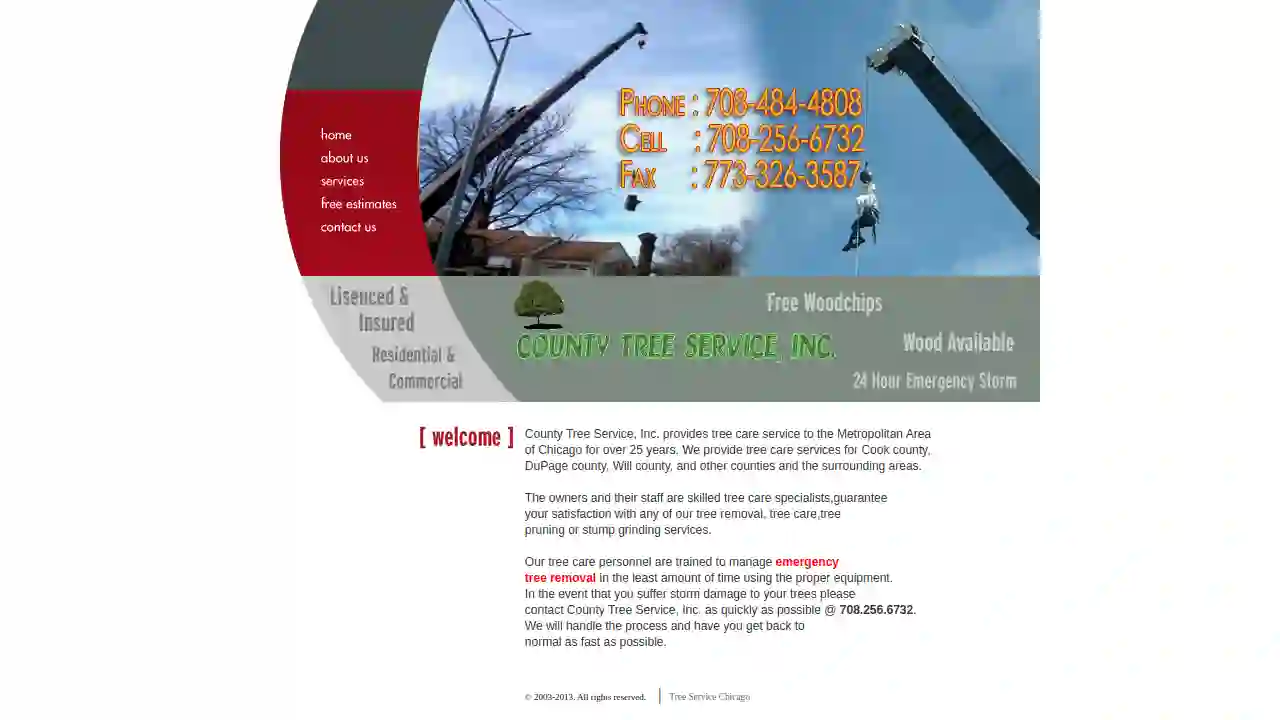
County Tree Service
4.7117 reviews6600 W. 41st St., Stickney, IL, 60402, USCounty Tree Service, Inc. provides tree care service to the Metropolitan Area of Chicago for over 25 years. We provide tree care services for Cook county, DuPage county, Will county, and other counties and the surrounding areas. The owners and their staff are skilled tree care specialists, guarantee your satisfaction with any of our tree removal, tree care, tree pruning or stump grinding services. Our tree care personnel are trained to manage emergency tree removal in the least amount of time using the proper equipment. In the event that you suffer storm damage to your trees please contact County Tree Service, Inc. as quickly as possible @ 708.256.6732. We will handle the process and have you get back to normal as fast as possible.
- Services
- Why Us?
- Accreditations
- Our Team
- Testimonials
- Gallery
Get Quote
Winkler Tree & Lawn Care
4.7212 reviewsChicago, US- Services
- Why Us?
- Gallery
Get Quote
Over 16,467+ Tree Service Companies registered
Our tree service experts operate in Geneva and beyond!
TreeServiceMatch has curated and vetted the Best Arborists in and around Geneva. Find a reliable pro today.
Frequently Asked Questions About Tree Services
- Extensive dieback: Large portions of the tree's crown are dead, with no signs of new growth.
- Severe bark damage: Large sections of bark are missing or severely damaged, exposing the inner wood.
- Root decay: Mushrooms or conks growing at the base of the tree, indicating fungal decay in the root system.
- Leaning precariously: The tree is leaning significantly and showing signs of instability.
- No leaves or buds: During the growing season, the tree is completely bare of leaves and shows no signs of new buds forming.
- Woodpecker holes: While a few woodpecker holes are not necessarily a cause for concern, numerous holes can indicate insect infestation or decay within the tree.
- Safety: Tree work can be dangerous, especially when dealing with large trees or hazardous situations. Professional arborists are trained in safe climbing, cutting, and rigging techniques, minimizing the risk of accidents and injuries.
- Expertise: Certified arborists have the knowledge and experience to properly assess tree health, identify potential hazards, and recommend the best course of action.
- Specialized Equipment: Tree service companies have access to specialized tools and equipment, such as aerial lifts, cranes, and stump grinders, enabling them to handle complex jobs efficiently and safely.
- Efficiency: Professionals can complete tree work much faster than homeowners, saving you time and effort.
- Proper Cleanup: Reputable tree service companies will clean up the work area thoroughly, removing debris and leaving your property tidy. They'll also handle the disposal of tree waste responsibly.
- Peace of Mind: Hiring a professional provides peace of mind knowing that the job will be done correctly and safely. You'll also be protected by their insurance coverage in case of accidents or damage.
- 10 feet away from foundations for small trees (mature height under 30 feet).
- 20 feet away from foundations for medium-sized trees (mature height 30-70 feet).
- 30 feet or more away from foundations for large trees (mature height over 70 feet).
- Tree Protection Zone (TPZ): Establish a designated area around the trees that is off-limits to construction activities. The size of the TPZ depends on the tree's size and species, but generally, it should extend to the drip line (the outermost edge of the tree's canopy).
- Root Protection: Avoid digging, trenching, or compacting the soil within the TPZ. If excavation is necessary, use hand digging or air spading to minimize root disturbance.
- Trunk Protection: Protect tree trunks from damage by wrapping them with protective barriers, such as burlap or plywood.
- Branch Protection: Avoid cutting or damaging branches unless absolutely necessary. If pruning is required, have it done by a certified arborist.
- Watering: Ensure trees receive adequate water during construction, especially if the soil has been disturbed or compacted.
- Monitoring: Regularly monitor trees for signs of stress or damage during and after construction.
How do I know if a tree is dying?
What are the benefits of hiring a professional tree service?
How close to a house can you plant a tree?
What is the best way to protect trees during construction?
How do I know if a tree is dying?
- Extensive dieback: Large portions of the tree's crown are dead, with no signs of new growth.
- Severe bark damage: Large sections of bark are missing or severely damaged, exposing the inner wood.
- Root decay: Mushrooms or conks growing at the base of the tree, indicating fungal decay in the root system.
- Leaning precariously: The tree is leaning significantly and showing signs of instability.
- No leaves or buds: During the growing season, the tree is completely bare of leaves and shows no signs of new buds forming.
- Woodpecker holes: While a few woodpecker holes are not necessarily a cause for concern, numerous holes can indicate insect infestation or decay within the tree.
What are the benefits of hiring a professional tree service?
- Safety: Tree work can be dangerous, especially when dealing with large trees or hazardous situations. Professional arborists are trained in safe climbing, cutting, and rigging techniques, minimizing the risk of accidents and injuries.
- Expertise: Certified arborists have the knowledge and experience to properly assess tree health, identify potential hazards, and recommend the best course of action.
- Specialized Equipment: Tree service companies have access to specialized tools and equipment, such as aerial lifts, cranes, and stump grinders, enabling them to handle complex jobs efficiently and safely.
- Efficiency: Professionals can complete tree work much faster than homeowners, saving you time and effort.
- Proper Cleanup: Reputable tree service companies will clean up the work area thoroughly, removing debris and leaving your property tidy. They'll also handle the disposal of tree waste responsibly.
- Peace of Mind: Hiring a professional provides peace of mind knowing that the job will be done correctly and safely. You'll also be protected by their insurance coverage in case of accidents or damage.
How close to a house can you plant a tree?
- 10 feet away from foundations for small trees (mature height under 30 feet).
- 20 feet away from foundations for medium-sized trees (mature height 30-70 feet).
- 30 feet or more away from foundations for large trees (mature height over 70 feet).
What is the best way to protect trees during construction?
- Tree Protection Zone (TPZ): Establish a designated area around the trees that is off-limits to construction activities. The size of the TPZ depends on the tree's size and species, but generally, it should extend to the drip line (the outermost edge of the tree's canopy).
- Root Protection: Avoid digging, trenching, or compacting the soil within the TPZ. If excavation is necessary, use hand digging or air spading to minimize root disturbance.
- Trunk Protection: Protect tree trunks from damage by wrapping them with protective barriers, such as burlap or plywood.
- Branch Protection: Avoid cutting or damaging branches unless absolutely necessary. If pruning is required, have it done by a certified arborist.
- Watering: Ensure trees receive adequate water during construction, especially if the soil has been disturbed or compacted.
- Monitoring: Regularly monitor trees for signs of stress or damage during and after construction.